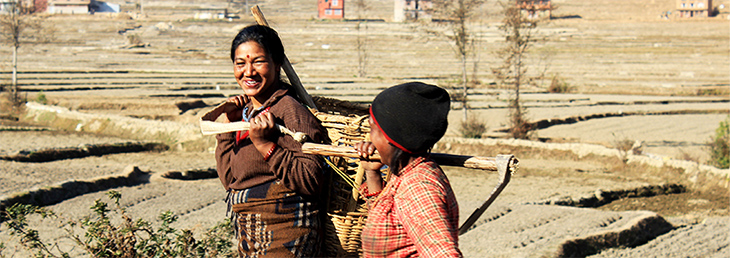The Health Policy Project ended in 2016. Work continued under Health Policy Plus (HP+) until 2022.
NEWS & VIEWS

Posted on March 10, 2014
By Elisabeth Rottach, Gender Advisor, Health Policy Project, Futures Group
WASHINGTON, DC—Since the first International Women's Day in 1911, women have unequivocally increased their social, economic, and political rights and empowerment and achieved greater freedoms across the board. Globally, a greater proportion of girls are attending school, and more women are employed and hold political office than ever before. More women are able to choose the timing and number of children they want, through increased contraceptive access and choice. Maternal mortality rates are on the decline.
Despite these advances, women still face numerous barriers to equality. Discrimination against girls in education and women in the workplace is pervasive. Women's access to basic health services is limited, leading to preventable illnesses and death. Violence against women, the most egregious form of gender inequality, is pervasive across countries, societies, and cultures. We must continue to build on the momentum created over the past century to inspire change, challenge the status quo, and create a more equal, just, and healthy world for all women, men, and children.
For International Women's Day on March 8, keeping in mind the successes to date and the challenges ahead, we share five action steps summarizing how the USAID-funded Health Policy Project (HPP) applies an evidence-based approach to scaling up health projects with a focus on gender equality.
- Assess scalability: Assess the intervention and environment in which the project will be scaled up to identify gender barriers and opportunities relevant to scale-up.
- Prepare for scale-up: Gather a diverse resource team of local leaders to ensure that all implementation needs are met during scale-up. Avoid treating women and men as homogeneous groups---instead ensure that the team reflects diversity of age, ethnicity, sexual orientation, disability, and other relevant characteristics.
- Develop a strategy for scale-up: Ensure that the action plan for scaling up an intervention includes specific gender equality goals. Setting gender equality goals will help sustain focus on gender throughout the scale-up process and hold program managers and staff accountable for gender equality commitments.
- Implement and monitor scale-up: While executing the project, include diverse local groups to help track progress towards meeting the gender-related goals. It's important to establish feedback mechanisms to enable proper monitoring from a broad range of stakeholders.
- Evaluate outcomes of scale-up: Measure the project's impacts, specifically its successes and failures in reaching its gender-related goals.
Gender inequality affects women's and girls' health and the health of families and communities. To improve health, countries must put gender equality at the center of health and development efforts. In order to systematize the integration of gender equality into the scale-up of health interventions and best practices, we encourage use of these five action steps.
This five-step approach to incorporating gender into scale-up of policies and programs was developed by HPP's Gender, Policy and Measurement program (GPM), implemented in collaboration with MEASURE Evaluation.
For more information on HPP's work in gender, click here.
For more information about HPP's GPM program, click here.
What's New
- Something to Build On: “Innovation Exchange” Celebrates the Health Policy Project’s Close and a New Beginning
- What Will it Take for Tanzania to Achieve ART Targets and Ensure Long-Term Sustainability of the HIV Response?
- Helping Kenya’s County Leaders Advocate for Increased Health Investments
- HPP Holds Working Meeting on Ensuring Responsible PEPFAR Transitions for Key Populations
- Health Policy Project Celebrates 2016 International Women's Day
- HPP Staff Participate in White House Conference on HIV Stigma Reduction

